|
A little while ago on the blog I wrote about the “Native Cameo” where I said (look at me quoting me!) “Native Cameos” are those 1-2 episode, sometimes intermittent appearances by Native characters on television shows. What I have found *spoiler alert* is that these Native Cameos resettle settler colonial claims to legitimacy, meaning, they justify, and normalize colonization and settler colonial occupation of Indigenous spaces and Indigenous histories. You can read more here about the Native Cameo and why NBC hates Adam Beach if you want to. Anyway this past weekend I sat down to watch every episode of the newly released “Unbreakable Kimmy Schmidt” (they alive dammit!) and to my surprise there was a Native cameo! Of course the scenario was the same as it always is - me, half-watching the television and then suddenly I start yelling at my husband “there’s an Indian on TV! There’s an Indian on TV!” and then my daughter comes running and says “where? Where?” And I point excitedly at the TV and she goes: “But that’s just that blonde lady from that other show you watch.” 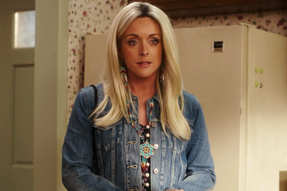 This is Jenna (sorry Jacqueline) as a Native person. See she's wearing a beaded necklace and she has dark roots (literally and figuratively, HA!) This is Jenna (sorry Jacqueline) as a Native person. See she's wearing a beaded necklace and she has dark roots (literally and figuratively, HA!) Ya burnt “Unbreakable Kimmy Schmidt.” Ya burnt. So yes, Jenna (sorry, she’s called Jacqueline in this show although she will always be Jenna Maroney to me…) is a secret Native American. Not like “Top Secret” where she sometimes puts on her Pendleton jacket and heads out to fight colonization or to try and push secret government agencies for more money for language revitalization… but a secret Native American because she thinks the path to prosperity is to become an upper east side wife and upper east side wives are white… and blonde so she decides not to be Native American anymore, at least not in the “I have brown hair and brown eyes and respect my parents” kind of way. Jenna (sorry, Jacqueline) has rejected her Native heritage by bleaching her hair blonde, wearing blue contacts, and adopting the accent of a rich white person. She has also taken to... ignoring her children, wasting water, hiring a tutor to do her sons work, going to spin class, having a tiny dog (that doesn’t poop) and not knowing how to drive (all white people things I guess... That’s right – white people tropes. Or at least- rich, white people tropes.) “Unbreakable Kimmy Schmidt” like “30 Rock” (both the brain child of Tina Fey) before it invites the audience into a world of caricatures, slowly breaks down the walls of those caricatures, but never apologizing for their existence as tropes, modern, tongue-in-cheek tropes that ask us to laugh with them (but mostly people probably laugh at them). It’s a miniscule distinction to some people, but to others, like anyone except for white people, it’s important because we don’t get much screen time, so the screen time we got says a lot. And if the minority representation on the show is to make fun of their... minority-ness well that also says a lot. Since this past weekend people have started writing to me asking “what do you think” or “how am I supposed to feel about this?” I could see it being a bit jarring when it first comes up, suddenly this very blonde white lady is not so blonde, not so white. Both of her parents are Native in the show, they are the Native cameos as one cannot exactly count Jenna (sorry Jacqueline) as a cameo because she’s a non-Native actress playing a Native who is pretending to be white. I didn't exactly know what to say because my initial instinct was to be all "It wasn't the worst, it wasn't the best. There were pros and cons." So I made a list. Here are the pros and cons of the "Jenna (sorry Jacqueline) is a Native American" story... (according to me, and I know everything). PRO: Mascots are bad. Yeah they are. When Jacqueline sees an Indian mascot climbing off a bus she gets upset. Lillian (who is the landlady for Kimmy) says “After everything Native Americans have been through… now still with this nonsense” and Jacqueline decides it’s time to do something about it. Yeah it is. CON: After she beats the crap out of the Indian mascot she howls at the sky like a wolf. I don’t know why. The implication to me was “when Natives go primitive you best watch out, cause they are going all the way back to when they were like animals.” And if that was the message you wanted to send writers – fuck you. WHAT THE WRITERS SHOULD KNOW: We weren’t “animalistic” nor are we “animalistic.” Not that it is bad to be compared to or in balance with animals, but this idea that Natives were "lesser than human" because they were so identified with animals (a very western idea of hierarchy BTDubbs) is an ingrained stereotype built from colonization to excuse the mass murder of Indian people and the taking of the land. You don’t feel bad about shooting the wolf when he comes too close to town… now do you. SUGGESTION: No more howling. Period.  PRO: White people may be doing everything they can to claim Native heritage because they think it somehow gives them street cred to be 1/16th something but there are some Native people who can “pass” as white and choose to. Because they may look more phenotypically “white” than what is considered Native some Natives can (and do) pass as white. It's an interesting choice. Some Native people aren't actively hiding their Native-ness so much as avoiding it. Some people treat it like "that thing" but do nothing to be a part of their native culture. Like my elders have said to me before "being a Native is expensive and tiring" and it's true. There are many Native people who don't just think about how "cute" it is to have Native ancestry, they would rather not worry so much about what it means. Again, a lot of this is probably informed by a long history of having to hide Nativeness in order to survive but also exercising the autonomy to decide how or what it means to live as a "Native" is a fascinating subject. These issues of identity should be talked about. If you want to join this conversation, it's a WHOLE conversation not just a subplot. CON: Jacqueline is played by a white actress pretending to be a Native person who is pretending to be white. WHAT THE WRITERS NEED TO KNOW: Lots of white people have played Indian people in movies… on tv… on the radio… at sporting events… and even if you don’t want it to, it adds a layer of disingenuousness to your story. When white actresses are given the leeway to play Native it hearkens back to these days where any actor could play native by slapping a headband on or crying for the spoiling of the earth on TV commercials (stop littering. You are making the Natives sad). It might not be “fair” or “what you intended” but this is the way that it is when white people play Natives… and it will be this way until we get more positive representations of Native people, by Native people, with Native people. That’s what you’re signing up for with this story writers, deal with it. SUGGESTION: Hire more Native people, actors, writers, producers to work with you on this. Cause dang, that would be fun. Also-- Jacqueline needs a bunch of real Native cousins, played by Native actors. They need to call her out on her B.S. and maybe educate the audience a little bit. They can say things like “you know just dying your hair blonde doesn't make you white, like putting on a beaded necklace doesn't make you Indian. So really… you need to get it together.” 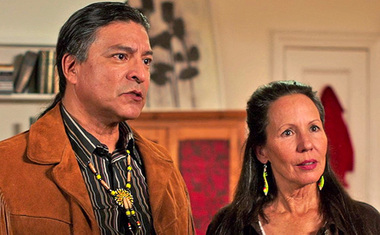 PRO: Not all Native people are super spiritual and in tune with nature. Not all of them own casinos and enjoy the "Free stuff." There are many many complex and diverse ways that Native people experience being Native. Sometimes Native people even reject their heritage. Why this happens is a story worth telling. For a long time the rejection of Native heritage was the story of many generations of Native people who were forcibly taken from their families in an effort to assimilate them. It’s not just a rejection of the heritage that is interesting, it’s that Jaqueline ties this to “success” and the implications of what it means that a Native person has internalized "success" with a rejection of Nativeness is a very complex story to include as part of a television show. Perhaps this is setting up an opportunity for a conversation about the many varied experiences of Nativeness in this world (let's hope). We are a diverse group of people so our experiences are very diverse. Our cultures are living… how we choose to live with those cultures has many different outcomes. CON: And when she rejects her Native culture her parents are all “see ya, wouldn’t wanna be ya.” WHAT THE WRITERS SHOULD KNOW: Native parents, especially Jacqueline's parent's generation, are probably readily familiar with the impacts of boarding schools and the assimilation policies that attempted to erase Native culture from Native people. I am surprised that they did not lecture her more, or at least try and tell her that she is following down a lonely path for a Native person in this world. Just because you, lovely writers, didn't learn about it in history class, doesn't mean that Native people haven’t lived this history. Her parents (who are the actual two Native actors on the show) should be fleshed out to include how Native people are not just here carrying on their culture, but are here actively resisting the continued degradation of their culture, especially when it comes to the success of the future generations. And if it wouldn't, in your opinion, be them who would call Jacqueline on her BS and question her very (colonized, westernized) view of the world, at least, at least allow one of her mean Native aunties to show up and throw some shiz down when she decides to leave. SUGGESTION: Just give Jacqueline’s parents their own show already. I know people are (understandably) somewhat upset about this tongue in cheek portrayal of Nativeness on this very white show in a very white universe. I sometimes think that it’s just reflective of how exhausting modern, privileged, white centered comedy is. It’s always outside looking in. It’s always “look at my privilege, be awash in my privilege, watch my privilege allow me to make whatever jokes I want or to write whatever I want because I want to oh and by the way here's where i say sorry if you were offended.” It’s so tongue in cheek that it can be exhausting – especially when that’s all there is. (It's the reason why those pointed lines that make fun of this privilege are so exciting for people. It's also why people think they can get away with the other problematic portrayals of race on the show "but we made a joke about privilege, so we can now make this problematic character speak in a funny accent...)
As an avid TV watcher I know most of these universes are basically “white universes.” They are reflections of how white people see their world. Maybe they try to say they are “diverse” universes, but at the end of the day with all the decision making really in the hands of a bunch of very wealthy white people we all know it’s true. I heart Tina Fey (I do) but I don’t expect her to be adept at telling a Native American story. This is why who sits in the writing room really matters, because those multitude of voices (if they aren’t just a bunch o’ white people) can shape a story to be what it could be, and not just the brain child of people that haven’t… oh I don’t know… taken a Native American studies class, hung out with a Native family, gone to the Cheesecake Factory with a bunch of hilarious Native students…because those stories have yet to be told, the complex yet hilarious story of what it means to be this #BusyCuteAndNative So that’s all I really want to say about it. If you’re gonna do a Native story (which hey, why not?)… do it right. Set higher standards. You can’t access the Native experience just because you have some people who are Native descendants possibly working on your staff. How much pressure is that for those people to “speak for the Native experience.” Do it right. Hire some Native writers, producers, editors... It’ll be way funnier that way. I promise. Troll the respawn, Jeremy. PS. Yes, Tina Fey, there are Native people in Hollywood (and outside of Hollywood) who can help you out. Need help to find them, email me and I'll point you in the right direction.
4 Comments
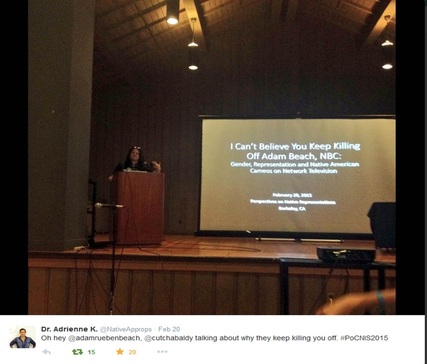 Adam Beach re-tweeted this photo of me doing a presentation about Adam Beach. #BasicallyWeAreBestFriendsNow Adam Beach re-tweeted this photo of me doing a presentation about Adam Beach. #BasicallyWeAreBestFriendsNow This past Friday I went to the Perspectives on Native Representations symposium with keynote speakers Adrienne Keene (of Native Appropriations); Migizi Penseneau (1491s!) and Matika Wilbur (from the 562 Project!) and it was pretty great. I was there to present and was lucky enough to have a group of good friends come to sit with me and watch all the other presentations as well. It was a fully day talking about the importance of representation of Native peoples as the modern, awesome, funny, strong, photogenic, survivors we are. I presented on my love of all things Adam Beach as a way to finally register my disappointment with NBC who likes to bring Adam Beach on to tv shows to kill him off. I said "settler colonialism" a lot so that I would sound super smart and academic like. And then I talked about the "Native Cameo." And then Adam Beach re-tweeted a picture of me presenting about him. That's right, he hit that tiny little set of re-tweet arrows and shared it with all of his followers. And with that...I am willing to call this the best presentation of my growing academic career. Hands down. Now that we are best friends via Twitter Adam Beach let me just say, I also tweet sometimes about my favorite places to get Iced Tea. Feel free to re-tweet those as well. I Can't Believe You Keep Killing Off Adam Beach, NBC: Gender, Representation, Settler Colonialism and Native Cameos on Television OR I went to the Perspectives on Native Representations Symposium in Berkeley and Adam Beach re-tweeted me I don’t know about anybody else but ever since I was a little girl I have been in the habit of yelling every time there is an Indian on TV: “THERES IS AN INDIAN ON TV! THERE IS AN INDIAN ON TV!” and then I would expect everyone to come running. By the time I got to my formative TV watching it felt like (to me) that there wasn’t a whole lot of Natives on TV. Instead, I have often cataloged a collection of what I called the “Native cameo.” “Native Cameos” are those 1-2 episode, sometimes intermittent appearances by Native characters on television shows. What I have found *spoiler alert* is that these Native Cameos resettle settler colonial claims to legitimacy, meaning, they justify, and normalize colonization and settler colonial occupation of Indigenous spaces and Indigenous histories. These Native characters are also primarily male and do not have Native female counterparts. Native women are rarely mentioned as being part of modern discourse. To better critically analyze (or what I like to call “engage in Indigenous media analytics”) I have provided the following cheat sheet of what I have noticed about these Native cameos. In the Native Cameo… 1. Native Americans are spiritual peoples full of knowledge that is specifically aimed at addressing answers to questions and conundrums of main characters (Spiritual & Knowledgeable) 2. Native American characters remind us that history is… complicated (History) 3. Native American’s Own Casinos (Casinos)*** 4. Mascots are dumb (Booo Mascots!) 5. Native Americans are Men (Men) Okay here we go! 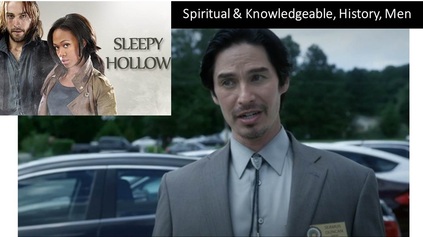 There’s this one episode of Sleepy Hollow that my friend Angel told me to watch, so I did. This episode has a Native character because there was a special Native monster that was causing a whole bunch of non-Native people to die in their dreams. Ichabod Crane (if you’ve never seen the show, he’s like in the present now because of something?) says “all we need is a Mohawk Shaman who can help us to defeat this monster.” And then his sidekick explains that there aren’t a lot of Mohawks or Shamans cause of colonization and genocide and stuff and Ichabod is all: How is that possible? Their nations stretched the continent! Their rules for governance formed the very basis for how we planned to unify thirteen diverse states in a single federation!" (You go Ichabod Crane) Luckily, they are able to find a Mohawk guy and, surprisingly, he teases them for assuming that he can help them because he’s Mohawk. Like every Mohawk knows how to get rid of a sleep demon. Except in the end he can solve their spiritual issue. Lord knows it would be weird if they had to approach at least TWO Mohawk guys before they found the right magical spiritual one. Rating: THERE’S A NATIVE ON TV, and he’s kinda funny, and he helps them to conquer the dream monster. So I’ll go with “coulda been worse.” 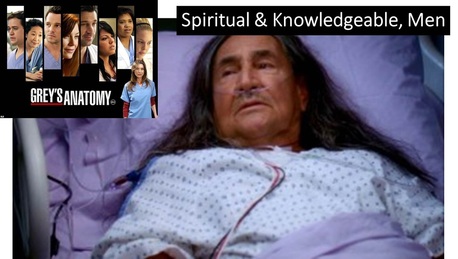 On an episode of Greys Anatomy where Izzie was going crazy and seeing her old boyfriend Denny even though he is dead she meets a Navajo man who is supposed to have heart surgery to take out his donor heart because he believes it is “haunting” him. Izzie decides this has something to do with her. The Navajo guy is very understanding when she opens up to him and tells him she is also haunted. And instead of going “well, sure, let’s talk about how my heart surgery is really about you” he patiently explains to her that she should burn everything that she still has tying her to the dead guy and that she probably shouldn’t do his surgery. RATING? THERE’S A NATIVE GUY ON TV, and he’s Navajo. So I’ll go with “Shonda Rhymes you have three million shows on television, I think you could maybe, possibly put one MAIN character who is a Native person on one of those shows.” 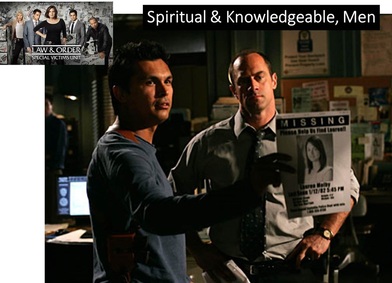 I don’t know if it’s fair to say that Adam Beach’s character on Law and Order: Special Victims Unit was all that spiritual. I’m unwilling to go back and watch his many episode arc to support my claims. But I do remember that there were several instances in which he offered some important discussion in to how “other” cultures would respond to whatever the issue of the week was. I was so looking forward to a very long tenure by this character. FINALLY, a Native character who is Native (yes, it’s true) but he’s also a cop on the beat, making jokes with Ice-T. Except that didn’t happen, because why would it? And Adam Beach was relegated to Native Cameo status when for some reason he went off the deep end and become some kind of vigilante justice cop and killed some guy because…whatever. I’m still bitter. 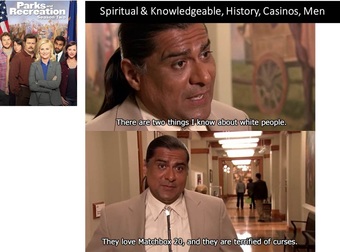 Parks and Recreation’s portrayal of Ken Hotate has always been very fascinating to me. I actually really like the dude. I like him because he’s got great delivery, and also because he gets to come into the show and be funny and then go away. I also like his confidence. He knows he’s got the money (the casino) and the pull to do what he wants. That’s an interesting position in this town that Leslie Knope points out, does not have the best history with Native people. On this week’s episode (from Tuesday) Ken Hotate made a super cameo in a commercial for the Wamapoke Casino which ended with the slogan “Slowly taking back our money from white people one quarter at a time” (I LOLd). 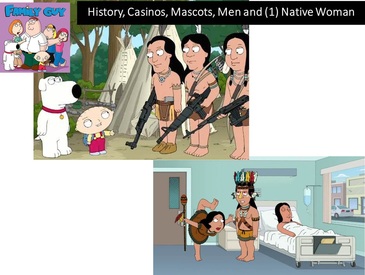 There are actually several times that Native people pop up on the Family Guy. “Native American What’s Happening” or “Offensive Native American Mascot” or “Peter saves the Native Americans.” In Season 12 Episode 6 “Life of Brian” Stewie and Brian travel back in time to Jamestown where they give Native Americans guns and change the course of history. When we catch up with Brian and Stewie in the present day. Brian tells Stewie: “Thanks to you the Indians killed all the white people and took over America.” This new, present day America is filled with brown faces, and Indians wearing headbands, with braids and jean jackets. The joke on the show is that Natives love their jean jackets (I have two of them, actually). Medical care is done by a shaman who does funny poses but offers no real help for a dying man. Native music is gibberish that all sounds the same. Native families live in houses that look like teepees and instead of “I love Lucy” they watch “I love liquor.” These are the stereotypes of Native people come to life. This is not a Native vision of the future where Native people weren’t mass killed and removed, this is a tongue in cheek representation of stereotypes shoved in to the audience’s face. Brian tells Stewie they have to go back to Jamestown to “set things right” as if this alternative future, where Native people are the majority and white people live on reservations is “wrong.” This, again, effectively resettles this space and makes it “right” to be under control of white settlers, and not under the control of Native people. 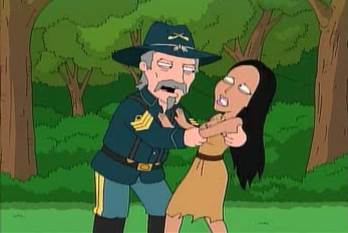 *Bonus Cameo* In another episode Peter remarks that he has always wanted to use a musket to go and save Native Americans from “rapacious Calvary men.” It then flashes to a Calvary raiding a Native village where one guy is kidnapping a woman to probably take her and rape her. Peter accidentally shoots her in the head. He then remarks something like “you don’t have to be afraid of him anymore.” The most disturbing part is that when I looked this clip up online the guy recording it lets out a huge laugh when this woman gets shot in the head. And there you have a Native Cameo featuring a Native woman. She is there to get kidnapped, possibly raped, and then shot in the head. Rating: There’s Natives on TV. They are cartoons. There is so much here to talk about. For instance- this idea that had the Indians been given guns they would have also used them to oppress white people. But I don’t have enough time right now. Maybe later. 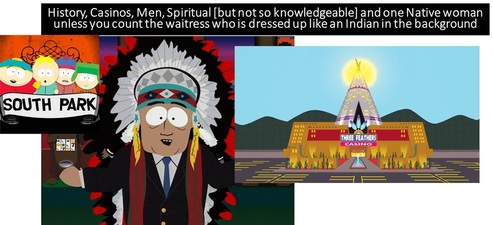 South Park actually has a number of episodes featuring Native American characters and cameos. (Like, Cherokee Hair Tampons, or A History Channel Thanksgiving, or Cartman’s Mom is a Dirty Slut) The most cameoed of cameos comes in Season 7 Episode 7 – “Red Man’s Greed.” In this episode South Park is trying to say that Native peoples are (now) just as obsessed with the trappings of capitalism as any other group. There is another layer added throughout this episode as well and that is what I call the “just desserts” layer. For instance, when the Natives decide to build a super highway through South Park, they buy all the land “out from under” the residents and force them to move. When the residents protest, they give them blankets with the SARS virus on them. There’s your just desserts white people. There’s even a joke about removal and relocation. South Park’s seemingly pointed is another settler colonial apology “we’re sorry for the genocide, you would genocide us too if given the chance” and also “we’re sorry for taking your land, you would take our land now too, if given the chance.” Dismissing the possibility that even in imaginary cartoon universes Native people could create a much different present and future because of their past experiences with genocide… well this re-settles the settler claims to innocence by saying colonization is “human nature.” RATING: South Park’s Indians are a mixed bag. I’m interested in this cartoon obsession with voice cadence, the way Indians talk and sound and even laugh. Maybe now I just want one Indian on TV who is like “oh you know, whatevs, it’s the bees knees, fer realsy.” Or says “totes” a lot. Okay we Natives don't say totes all that much. You know what we do say a lot... "BINGO!" #JustKiddingINeverWinAtBingo 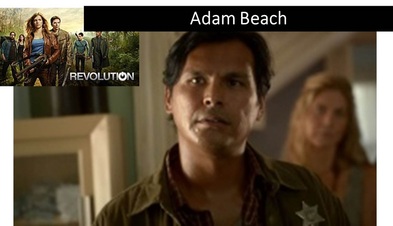 "Revolution" is technically not on the air anymore but when I started writing this very rigorous research down in my very fancy hardback notebook, "Revolution" was on the air and "Revolution" had Adam Beach on it. When the group ends up in the “Plains Nation” there is good old Adam Beach, and he’s the sheriff. I was very happy to see that they at least acknowledge that maybe, just maybe, at least one Native person survived the apocalypse. I mean it’s not like we haven’t survived an apocalypse before… Anyway, Adam Beach shows up to die one episode later, in a cage. And there you go. We managed to survive 500 years of attempts to annihilate, assimilate, exterminate us, but get us post apocalypse with no electricity and we are done for. I see what it means for people to be exposed to Native people in this way, whether it be young Native children who really do acknowledge and hold on to each and every portrayal, or non-Native people who might not ever engage with “modern” Native American people. Our TV watching experiences do shape us, even though they probably shouldn’t. Understanding, discussing, and complicating the Native Cameo is important. We are more than just cameos to a world that tries to pretend like we don’t exist, or that we aren’t fully functioning nations of people who deserve equal footing in politics and culture. Our worlds are more than just other to the “real” or “normal” world that is often portrayed on television. When we are represented in places like Network television it can and should speak to our continued investment in our shared existence, in our shared experiences on Indigenous lands. Also, it gives us the opportunity to watch Adam Beach do his Adam Beach thing… which is nice. Because I’m still bitter NBC. Still…bitter. 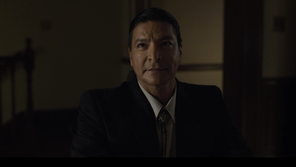 BONUS CAMEO – Someone in the audience (okay it was a 1491. And yes, I tried not to be all “OH MY GOSH ARE YOU ASKING ME A QUESTION and YOU ARE FROM THE 1491s!) asked me about “House of Cards.” Funnily enough, I had written something about "House of Cards" but had to cut it for time. Here it is: House of Cards – (History, Casinos, Men): Ah yes, the rich Native people on a show about rich people who try and take over the world. I binged on "House of Cards" (like any decent TV watcher would) last year because I just had to know what Frank was going to do after becoming Vice-President. And there was an Indian on the show, and he was smart and witty and just as big of a jerk as everyone else. I appreciated the “inside jokes” about Natives and politics and the BIA. Jokes about the BIA are always welcome. Also, jokes about Andrew Jackson, HA! I really appreciated when Frank goes to the big old white house that is on the Indian reservation (very symbolic, BTdubbs, we got our own white…house) and he thinks he’s a big deal and the Tribal Chair guy is like “you are not a big deal. We are on sovereign land. You are not my vice-president.” I clapped. Jokes about how even the vice-president doesn’t understand sovereignty… priceless. When you find out that the Indian casino is participating in what could probably amount to espionage in order to give money to buy an election because they got the money to spare I thought “um? Okay?” The discourse on casinos tends to focus on how casino power must or will corrupt. This is a narrative that is growing and starting to dominate how we talk about casinos. Instead of “casinos are active parts of the sovereignty and contribute to the self-determination of Indian nations” we have “casinos help Indian people to become rich and participate in politics the way other rich people do and that’s scary…” Talk about settler colonial fear. We may just get enough money and political clout to get our land back… uh oh. Rating: There’s an Indian on TV (Netflix) and he’s… just as horrible as everyone else on that show. So I guess that’s okay because if they would have made him way better than everyone on that show you’d wonder if they were doing that out of guilt for you know… all the genocide and small pox blankets. |
SubscribeClick to
AuthorCutcha Risling Baldy is an Associate Professor and Department Chair of Native American Studies at Humboldt State University. She received her PhD in Native American Studies from the University of California, Davis. She is also a writer, mother, volunteer Executive Director for the Native Women's Collective and is currently re-watching My Name is Earl... (5) Top PostsOn telling Native people to just "get over it" or why I teach about the Walking Dead in my Native Studies classes... *Spoiler Alert!*
Hokay -- In which I lead a presentation on what happens when you Google "Native American Women" and critically analyze the images or "Hupas be like dang where'd you get that dentalium cape girl? Showing off all your money! PS: Suck it Victorias Secret"
In which we establish that there was a genocide against Native Americans, yes there was, it was genocide, yes or this is why I teach Native Studies part 3 million
5 Reasons I Wear "Indian" Jewelry or Hupas...we been bling-blingin' since Year 1
Pope Francis decides to make Father Junipero Serra a saint or In Which I Tell Pope Francis he needs to take a Native Studies class like stat
I need to read more Native blogs!A few that I read...
Archives
June 2020
Categories
All
|

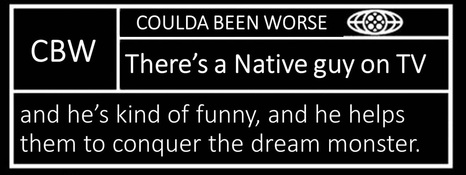
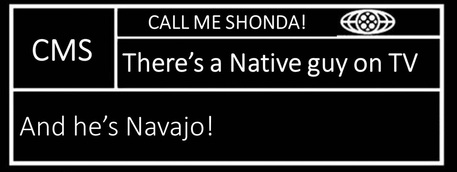
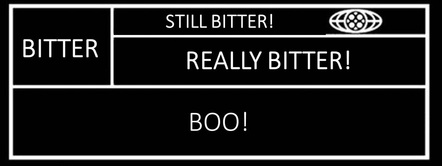
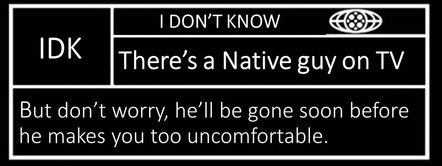
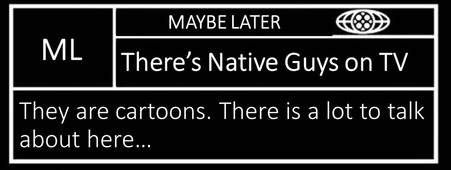
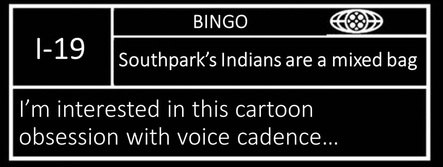
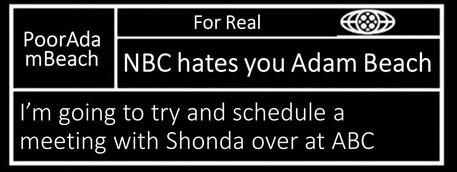

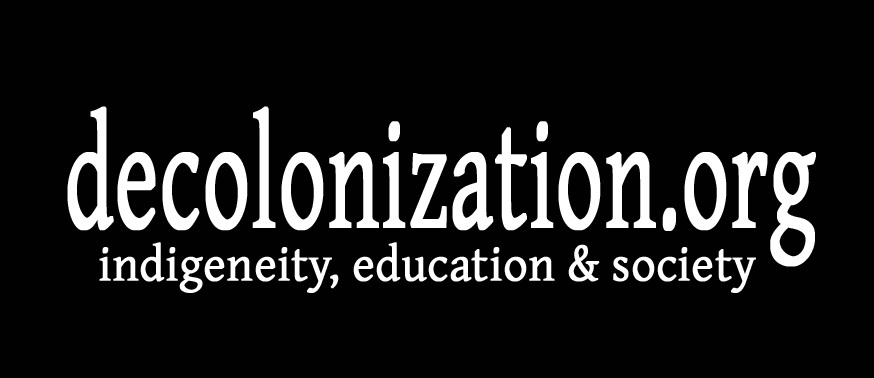


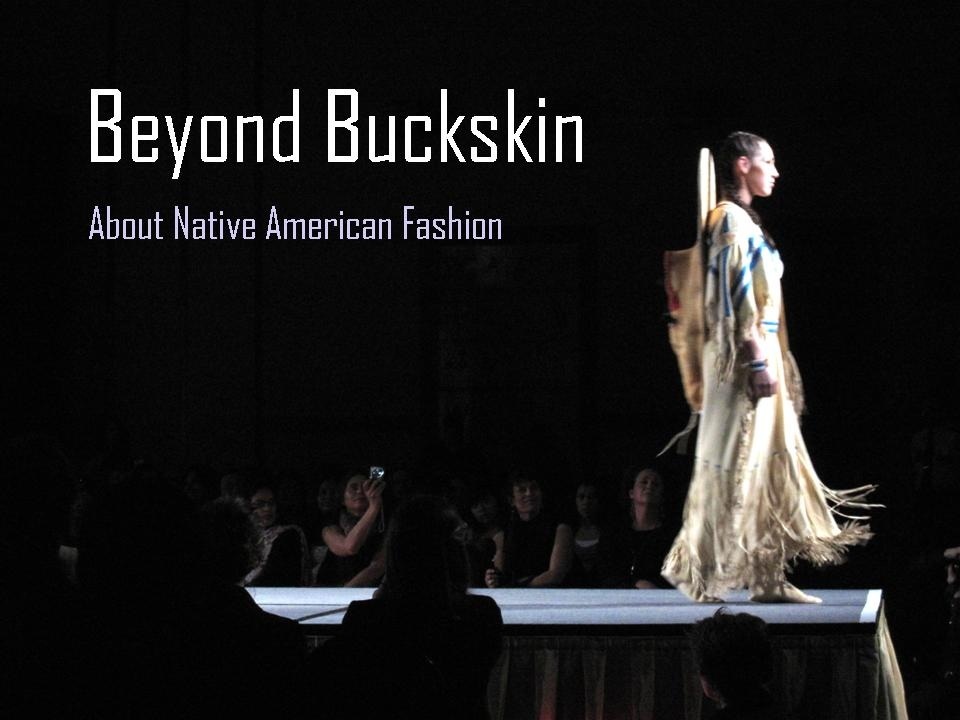

 RSS Feed
RSS Feed
